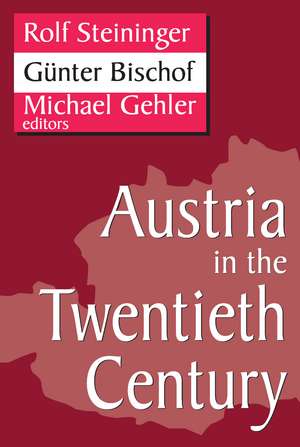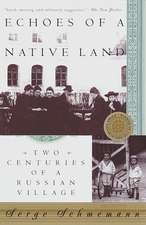Austria in the Twentieth Century: Studies in Austrian and Central European History and Culture
Autor Gunter Bischofen Limba Engleză Paperback – 15 dec 2008
| Toate formatele și edițiile | Preț | Express |
|---|---|---|
| Paperback (1) | 488.71 lei 6-8 săpt. | |
| Taylor & Francis – 15 dec 2008 | 488.71 lei 6-8 săpt. | |
| Hardback (1) | 1000.27 lei 6-8 săpt. | |
| Taylor & Francis – 20 sep 2017 | 1000.27 lei 6-8 săpt. |
Preț: 488.71 lei
Nou
Puncte Express: 733
Preț estimativ în valută:
93.52€ • 97.88$ • 77.83£
93.52€ • 97.88$ • 77.83£
Carte tipărită la comandă
Livrare economică 01-15 aprilie
Preluare comenzi: 021 569.72.76
Specificații
ISBN-13: 9781412808545
ISBN-10: 1412808545
Pagini: 378
Dimensiuni: 152 x 229 x 23 mm
Greutate: 0.44 kg
Ediția:1
Editura: Taylor & Francis
Colecția Routledge
Seria Studies in Austrian and Central European History and Culture
Locul publicării:Oxford, United Kingdom
ISBN-10: 1412808545
Pagini: 378
Dimensiuni: 152 x 229 x 23 mm
Greutate: 0.44 kg
Ediția:1
Editura: Taylor & Francis
Colecția Routledge
Seria Studies in Austrian and Central European History and Culture
Locul publicării:Oxford, United Kingdom
Cuprins
1: World War I And The First Republic; 1: On the Threshold of the Twentieth Century: State and Society in Austria before World War I; 2: Austria in the First World War, 1914–1918; 3: 12 February 1934: Social Democracy and Civil War; 4: The Christian Corporatist State: Austria from 1934 to 1938; 5: 12 November 1918–12 March 1938: The Road to the Anschluß; 2: World War II; 6: The Emigration and Exile of Austrian Intellectuals; 7: Resistance, Persecution, Forced Labor; 3: The Second Republic; 8: Allied Plans and Policies for the Occupation of Austria, 1938–1955; 9: Austria Under Allied Occupation; 10: The Austrian Economy: Basic Features and Trends; 11: “The Big Two”: TheGrand Coalition 1945–1966 and 1987–2000; 12: The Kreisky Era, 1970–1983; 13: Austria and Europe, 1923–2000: A Study in Ambivalence; 14: Austria between 1983 and 2000
Descriere
These fourteen essays by leading Austrian historians and political scientists serve as a basic introduction to a small but sometimes trend-setting European country














